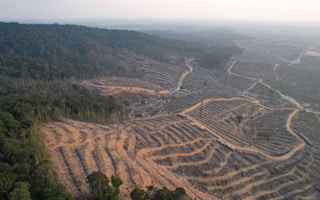The deforestation rate has soared in a protected area for Indigenous communities and critically endangered species in Indonesia, with a domain nearly half the size of Singapore cleared over the past three years, a report by a network of environmental groups has found.
To continue reading, subscribe to Eco‑Business.
There's something for everyone. We offer a range of subscription plans.
- Access our stories and receive our Insights Weekly newsletter with the free EB Member plan.
- Unlock unlimited access to our content and archive with EB Circle.
- Publish your content with EB Premium.
The territory overlaps with the pulpwood concessions of PT Mayawana Persada, which felled more than 33,000 hectares (ha) of forest from 2021 to 2023, according to a study titled Deforestation Anonymous released on 18 March by Greenpeace, Auriga, and Environmental Paper Network (EPN). This was a six-fold increase over the previous two years.
The report alleges that Mayawana Persada has ties with one of the world’s largest producers of wood pulp and products, Royal Golden Eagle (RGE). The accusation comes despite RGE having adopted a no-deforestation policy since 2015.
In response to the findings, a statement issued by RGE through its subsidiary APRIL said that “RGE categorically refutes the existence of any links between RGE and its shareholders and PT Mayawana Persada.”
“Current and future fibre supply to APRIL will be mainly sourced from its own and suppliers’ concession where any increased fibre supply needs will be met from productivity gains driven by significant investments in research and development and best practice silviculture,” said RGE.
The areas of natural forest which Mayawana Persada has cleared are being converted into pulpwood plantations. As of the end of 2023, Mayawana had established 45,187 ha of pulpwood plantations, based on analysis from satellite imagery by geospatial company TheTreeMap.
“
There could hardly be a more important area to conserve, yet it is being cleared with terrifying speed.
Arie Rompas, forest campaign team leader, Greenpeace Indonesia
Mayawana Persada’s forest clearing has intensified following a rise in global demand for wood pellets, pulp and viscose for clothing, paper, tissue and packaging, said the report.

Deforestation in PT Mayawana Persada’s concession, 2021-2023. Source: Deforestation Anonymous 2024 report
Indonesia is one of the world’s top exporters of wood pellets, which are used as an alternative fuel source due to their low cost and high energy efficiency, while the demand for viscose, which is marketed as an eco-friendly clothing option, has soared.
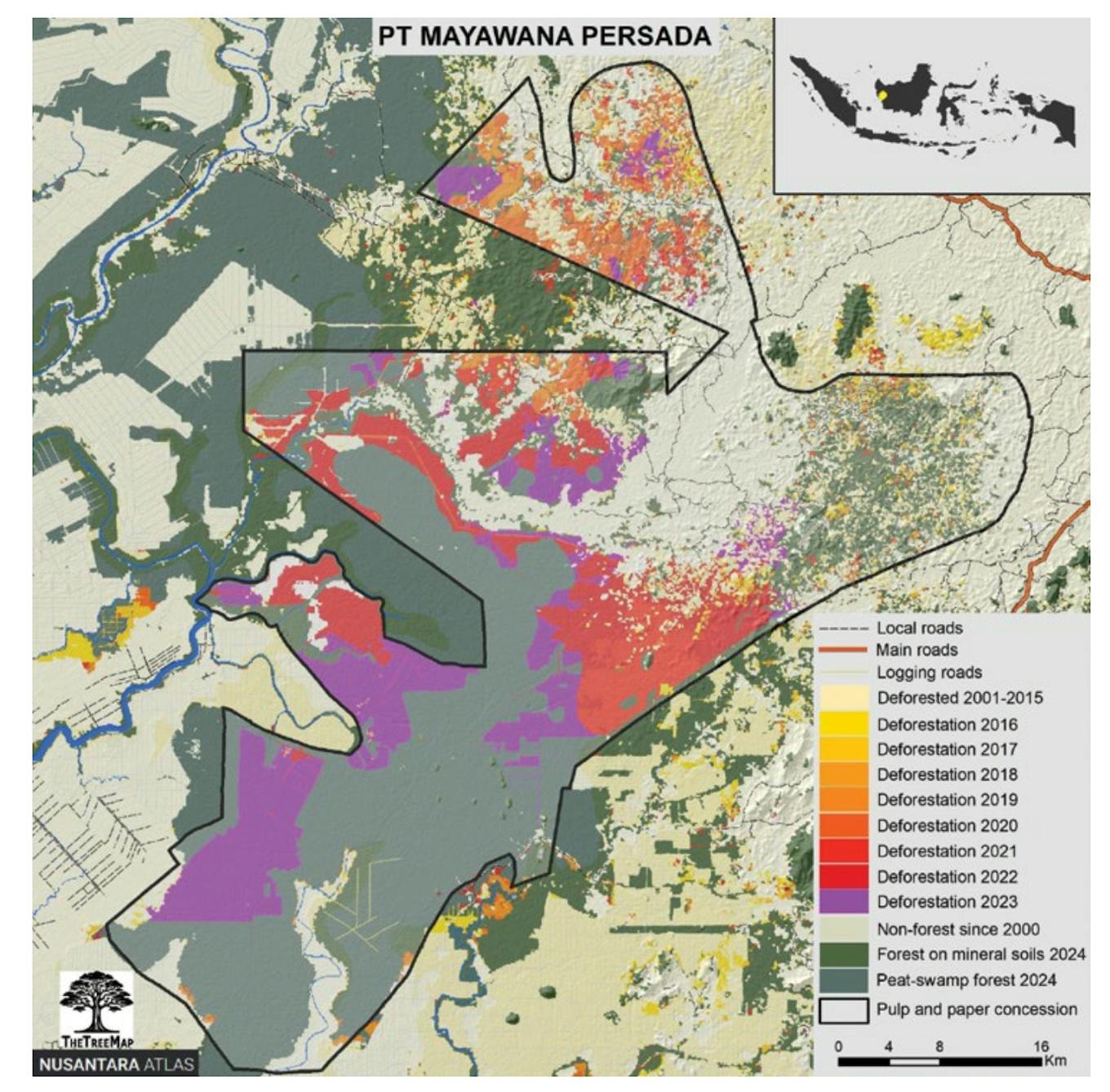
Satellite imagery shows deforestation in PT Mayawana Persada’s concession, from 2001 to 2023. Source: Nusantara Atlas/TheTreeMap, 2024.
Sacred land at risk
The large-scale forest clearing carried out by Mayawana Persada has been causing conflict between the company and the Dayak Indigenous People of Kualan Hilir, according to the study.
Their ancestral lands overlap with 3,650 ha of the concession, prompting community leaders to make an agreement with Mayawana representatives to exclude parts of their domain from being developed for pulpwood plantations in 2020.
Two years later, community leaders claimed that, contrary to the agreement, Mayawana had cleared forests considered sacred by the Kualan Hilir community and agroforestry sites that are important to local livelihoods, read the study. This led members of the Kualan Hilir community to impose customary sanctions and fines on the company in September 2022.
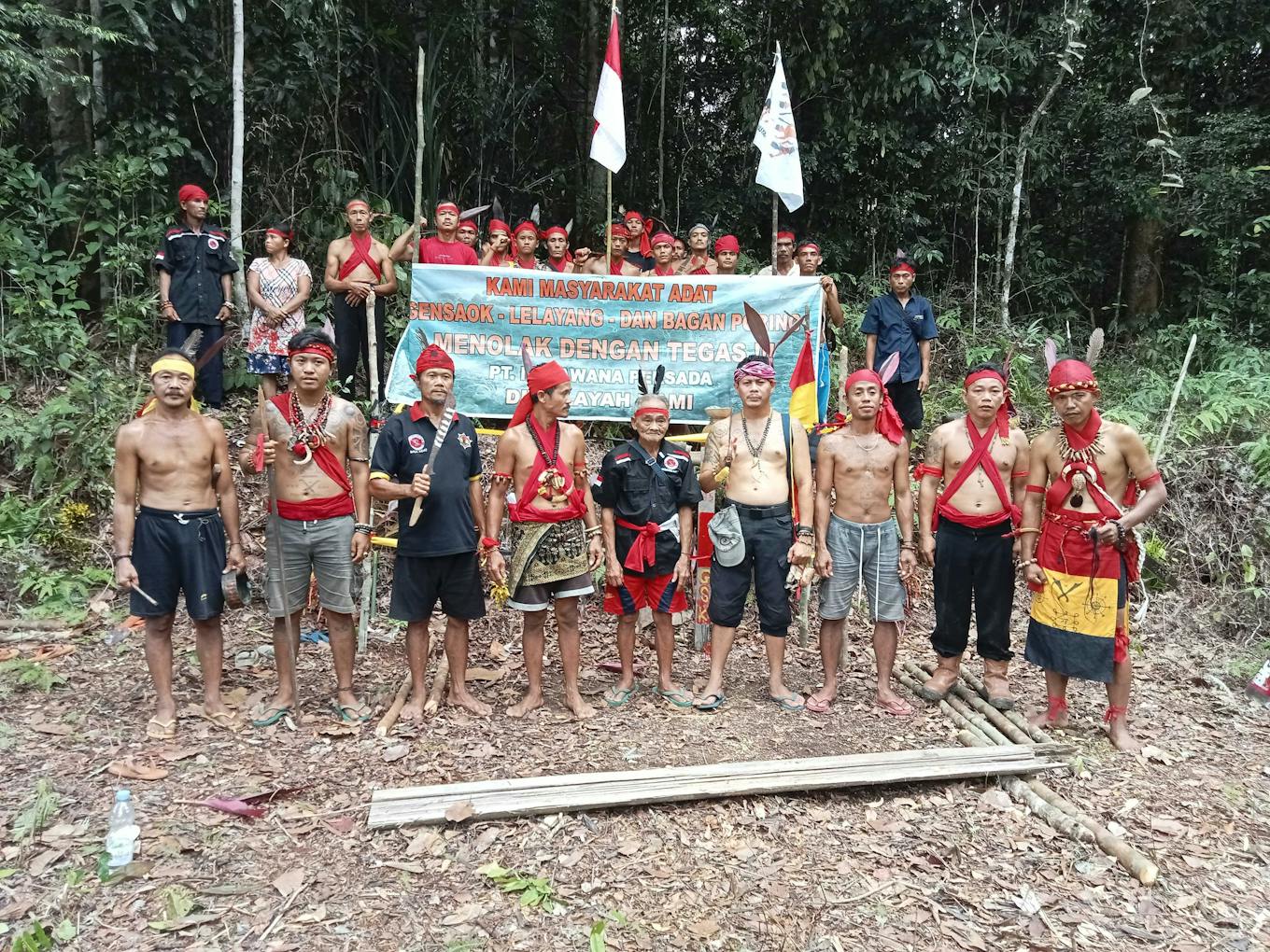
Indigenous communities in Kualan Hilir village in West Kalimantan province protest against the destruction of forests they consider sacred by PT Mayawana Persada, taken on 14 July 2023. Image: Kualan Hilir community
However, the report said Mayawana Persada ignored the agreement and refused to pay the fines, prompting the Indigenous community to stage a number of protests.
Arie Rompas, forest campaign team leader at Greenpeace Indonesia, told Eco-Business: “The company’s deforestation is impacting culturally important sites and traditional, sustainable livelihood resources of the Dayaks. Nothing is more important to Indigneous peoples than their traditional lands, and we believe this is not being respected by the company’s actions.”
Haven for endangered orangutans
The lowland forest ecosystem inside Mayawana’s concession provides habitat for a wide range of plant and animal species, including the critically endangered Bornean orangutan.
Some 49,208 ha of forest within Mayawana’s concession area is suitable habitat for the Bornean orangutan, according to the International Union for Conservation of Nature (IUCN), a non-profit.
Gunung Palung Orangutan Conservation Program (GPOCP), a conservation group that operates in the Mount Palung National Park, conducts wildlife surveys in the village forests that border the Mayawana concession area, providing annual data on which species are present and how abundant they are. GPOCP has approached Mayawana to conduct surveys inside the company’s concession area, but as of October 2023, the company had not responded, GPOCP said in the report.
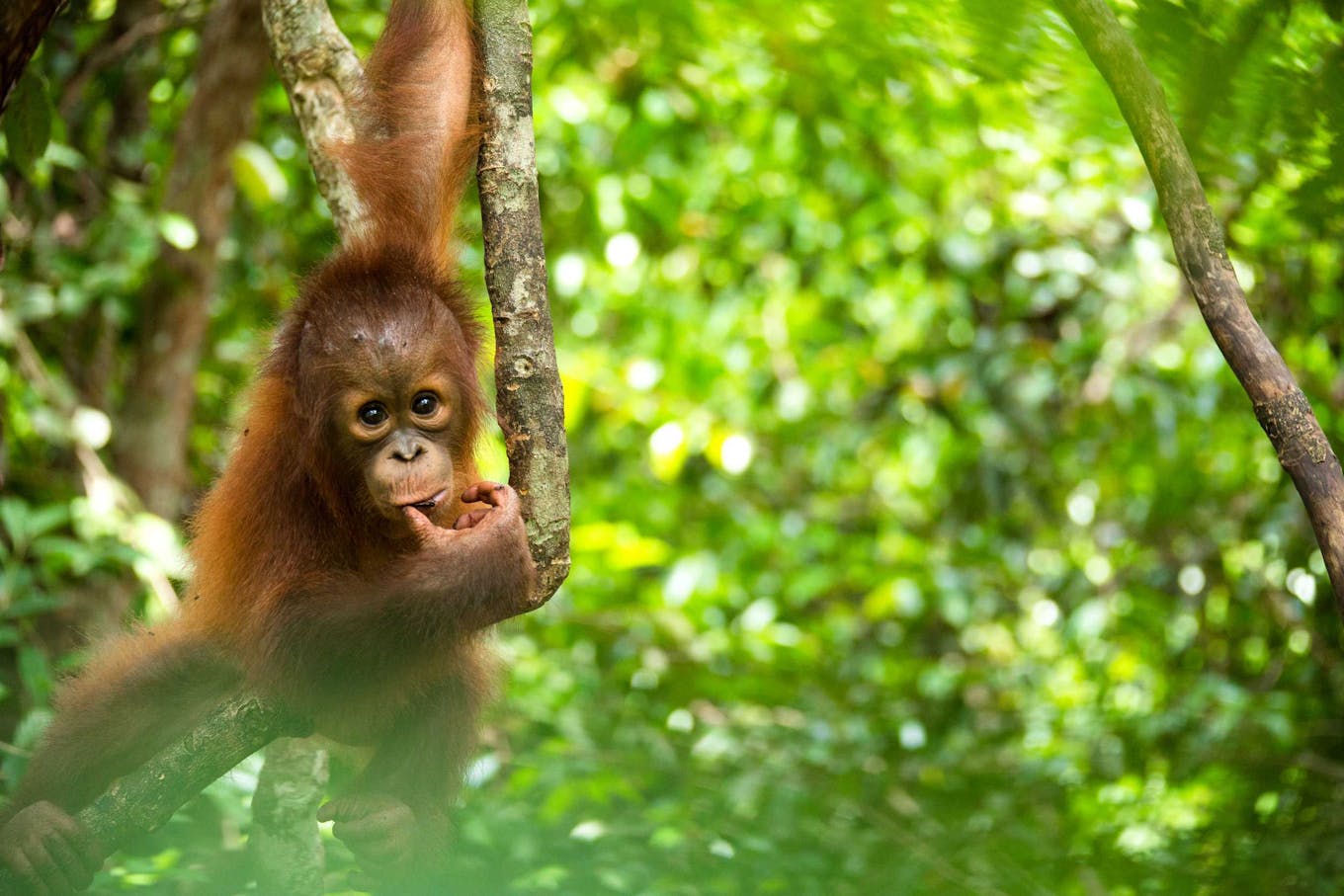
An estimated 61 Bornean orangutans live in the protected peat forest on Sungai Paduan. Image: Greenpeace
GPOCP researchers estimate that 61 Bornean orangutans live in the area around Sungai Paduan, a protected peat forest, based on observations of nests and calls and the availability of food sources in that area. The 6,788 ha area consists mostly of peat swamp rainforest and has been identified as one of the pockets of orangutan populations.
The GPOCP 2022 survey indicates that 10 mammal species and 85 bird species live in the Sungai Paduan protected forest. GPOCP also found evidence of other endangered and vulnerable species living within or near the concession boundaries, including Bornean white-bearded gibbons, helmeted hornbills, and sun bears.
“The Mayawana concession neighbours the famous Gunung Palung National Park and is an important part of a landscape that is vital to the survival chances of the critically endangered Borneo Orangutan. There could hardly be a more important area to conserve, yet it is being cleared with terrifying speed,” said Rompas.
The anonymous beneficiary?
Mayawana Persada’s concession used to be held by Alas Kusuma, a company that controls a number of forestry and oil palm companies in Indonesia.
As of January 2024, shares in Mayawana are not directly owned by a person or a group of people, but rather, in equal parts by two companies: Malaysian company Green Ascend, and Hong-Kong headquartered Beihai International Group Limited.
Both companies are owned by companies domiciled in the British Virgin Islands and Samoa, respectively.
Neither of the islands provide public access to company shareholder information which makes the identity of Mayawana’s ultimate beneficial owners hidden, the report read.
Green Ascend is linked to other anonymously backed companies with ties to Singapore-based paper and palm oil conglomerate RGE, owned by Indonesian billionaire Sukanto Tanoto.
This includes the holding companies for a woodchip mill in East Kalimantan, PT Balikpapan Chip Lestari, which shipped wood to RGE’s pulp mill in China, reported research in May 2023 by the same environmental organisations.
The Malaysian firm is also allegedly connected to holding companies for a new mega-scale pulp mill being developed in North Kalimantan, PT Phoenix Resources International, which is allegedly under the common control of RGE.
The Deforestation Anonymous report claimed that the Malaysian firm is also connected to holding companies for a new mega-scale pulp mill being developed in North Kalimantan, PT Phoenix Resources International, which is allegedly under the common control of RGE.
Green Ascend likewise is said to have corporate officers who have served in other forestry companies with ties to RGE like PT Adindo Hutani Lestari, a pulpwood provider in North Kalimantan which supplies wood to RGE’s pulp mill in Sumatra.
RGE has denied the claims made in the report: “We reiterate that there is no substance to the claims made by EPN that PT Phoenix Resources International and PT Mayawana Persada are linked to RGE. These claims are speculative and do not establish any factual connection or from of ‘control’ between RGE and these companies.”
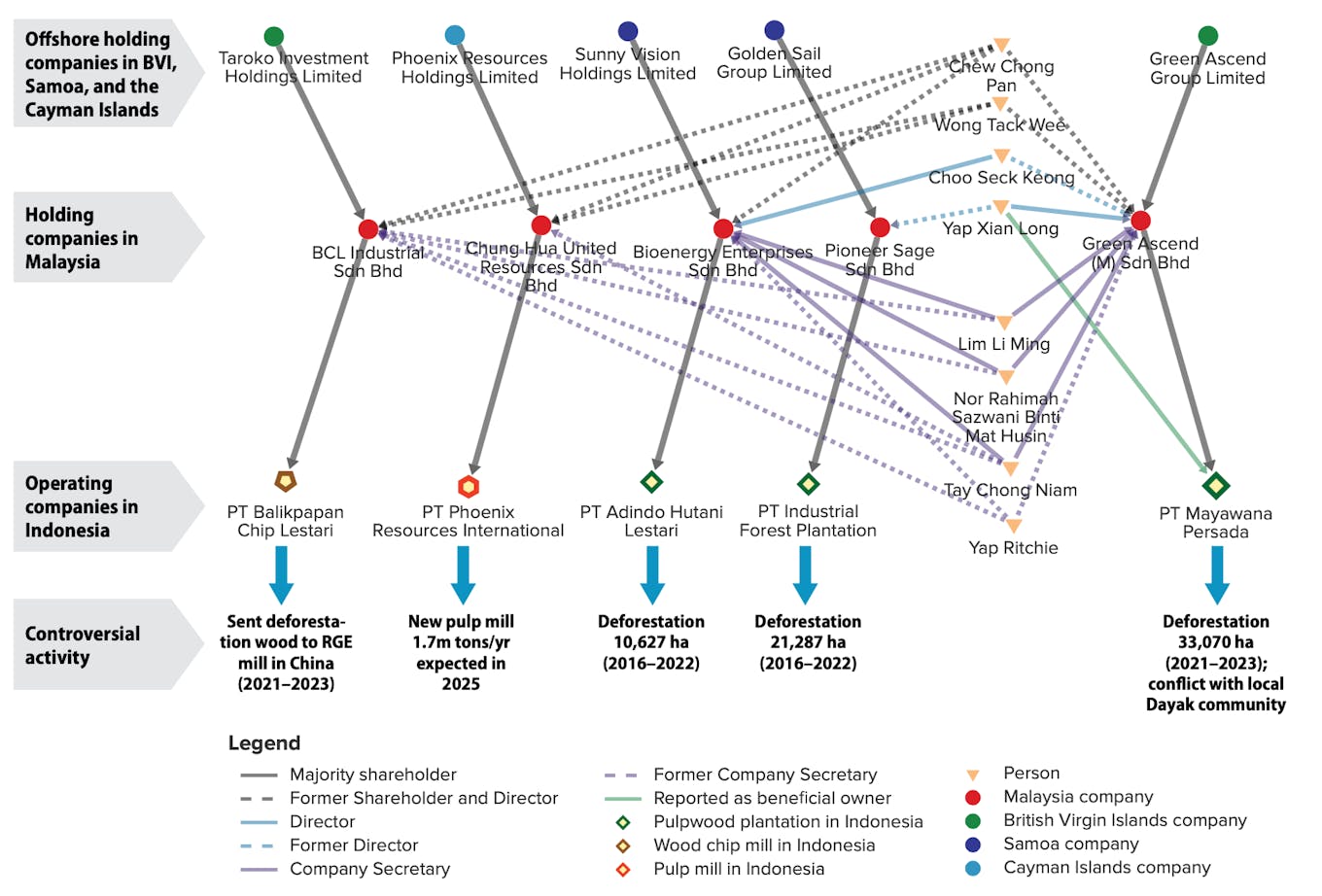
PT Mayawana Persada shared corporate officers with companies connected to RGE, according to a report from NGOs. Source: Deforestation Anonymous 2024 report
Besides its commitment to ‘zero deforestation’ in its operations and supply chain, RGE’s flagship pulp and paper company APRIL has launched a huge forest conservation project, a fire-free village network, and an expert working group on peatlands.
It has in the past decade, along with other major Indonesian pulp companies, RGE has been accused by NGO groups of various environmental and social issues, such as the clearing of hundreds of thousands of hectares of forest, including elephants and tiger habitat in Sumatra, along with the draining of carbon-rich peat forests that have led to the disastrous forest fires and haze that have plagued Indonesia over the past few decades.
Note: This story has been edited on 28 March to include RGE’s additional response made to Eco-Business.

